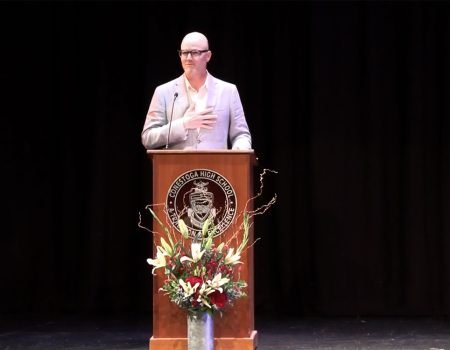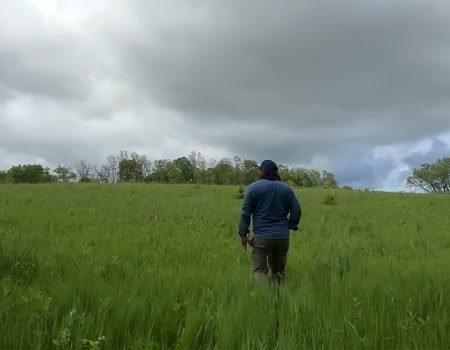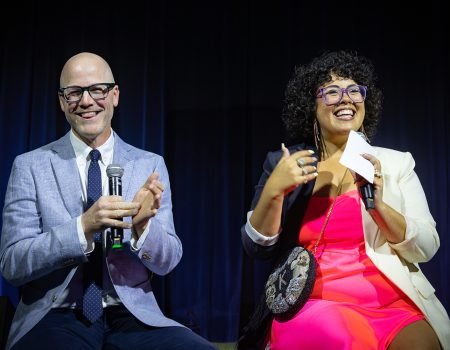Heavenly Peace
“I fucking hate Christmas.”
Yes, I said that. Out loud. To Abbi. Which, understandably, made her pretty sad.
It’s not the consumerism, the frenzy, or the faux cheer that gets me. It’s not the endless Zale’s commercials, the window displays, or saccharine greetings and salutations. It’s far more elemental than all of that, more basic, more Freudian.
On Christmas Day, 1980, my parents — their divorce nearly final — swapped custody of Chris and me. Prior to that day, my family led what appeared to my ten-year-old eyes a pretty ordinary family life in Oak Park, Illinois.
In 1977, my father was offered a job at the EPA’s Midwest Regional office in Chicago. After accepting, he and my mother chose to move from Indianapolis, to the Village of Oak Park for its proximity to downtown, it’s small town feel, and its diverse population. As an added bonus, architect Frank Lloyd Wright’s home and studio was there (as it ends up, at the end of our block), as were some 25 homes and building of his design. I imagine that the town’s literary history (Ernest Hemingway and Edgar Rice Burroughs were born there) piqued my mom’s sense of worldliness to boot.
Our green stucco bungalow at 550 Forest Avenue was the center of the neighborhood. We had a jungle gym, a basketball court, a clubhouse, a front yard tailor made for whiffle ball (including a hedge that acted as a home room fence), and a neighbor’s yard perfect for football. Sean and Dusty Wells, Joe and Jon Champelli, David Koleje, Cameron Gong, David Wright, Kirsten Lagoni — kids came from as far as Woodbine Street to play kick the can, hide and seek, and (Chris’ favorite) maul ball.
There was little to suggest anything short of domestic tranquility. We had swim team in the winter, and tee ball in the summer. Dad was our coach. Chris was a boy scout. I was a Cub Scout. There were block parties, school plays, and science fairs. On Sunday mornings, we attended St. Edmunds, where Chris and I were altar boys (that we snuck wine is a different story).
In the spring of 1980, though, cracks began to show. One memorable argument prompted my mother to step out of the car just prior to getting on the highway to summer vacation. Another shook the very foundations of the house (I know; I was hiding in the basement). In May, my parents announced that my mother would be temporarily moving with her company to Washington, DC. Over the summer, Chris and I made individual trips to visit her there. (The desperation and sadness I felt departing each parent on my first unaccompanied flights planted the seed — watered by countless trips between since — of my well-chronicled fear of flying. But that’s another story.) In October, they sat us down in the living room and announced that they were getting divorced.
It could be (it occurs to me now) that my disdain for relentlessly long, dark, cold winter days began that afternoon. I don’t remember it ever being dark before then. All I remember is darkness subsequent.
“Remember that thing we always said we hoped wouldn’t happen to our parents”? I asked Jon on the way home from Oliver Wendell Holmes Elementary one particularly raw October afternoon. “It’s happening to mine.”
Chris and I spent Christmas Eve at my father’s parent’s in Waterloo, Iowa. Of my father’s parents, seven siblings, and their wives, none asked about my mother, or how Chris or I felt. It was a like slight of hand trick purported on us by all adults. Through silence and omission, we were encouraged to pay no mind to that which was missing — smiles only; it’s Christmas.
In my mind’s eye, I picture my father then: eyes red around the edges, his stare distant and distracted, shoulders sunken just a bit. He is tired, defeated, and sad. Christofer, all braces and oversized glasses, must have known more, must have felt more than I did. He was thirteen. I was just ten. He threw himself around me then, shielding me from all of it.
Christmas morning, the air choked with Pall Mall smoke and fried egg fumes, I unwrapped a Capsela, some Crayola markers, and a turquoise Laguna v-neck. I was happy, but with a caveat. The clock was ticking. We were due in Vinton, Iowa — home of the Iowa School for the Blind, and roughly halfway between Waterloo and Cedar Rapids — at one o’clock.
After breakfast, we packed our gifts, bundled up, climbed into dad’s red and white Gran Torino (which looked, at ten-years-old, just like David Starsky’s), and drove south. Thin sheets of snow drifted across the cracked pavement of State Road 218. The sky was endless and white. The sun hung low and distant over fields of beheaded corn stalks. I sat on the vinyl seats, breathing onto the window, and scribbled circles into the condensation. The glass was cold on my fingertip. Through the frozen gray fog, I imagine that I spotted a farmhouse with a smiling, perfect family caroling around a fireplace. I mouthed along, “All is calm, all is bright…”
There, on the northern edge of Vinton, my father turned left down a long gravel driveway. My mother’s sister’s husband, Uncle Jack, stood leaning on his car a few hundred yards from Casey’s General Store. These men who had, just the summer prior, spent a week fishing, and laughing, tersley shook hands and exchanged just a few words. Chris and I stepped from the car. My father popped the trunk, handed us our suitcases, and held us. The air was bitter cold. The sky grew darker.
I don’t remember what we said, or whether we cried. If there was ever an instant when everything changed, though, that was it. I was my parent’s, my father’s, and then, my mother’s.
We climbed into Uncle Jack’s jet blue Caprice, and turned south. I knelt on the cloth seats and watched my father disappear through the rear window.
Six months later, my mother loaded my brother, our Springer spaniel, Alfie, and me into a brown, wood-paneled Cutlass Cruiser and led us out of Chicago. The Cruiser came to a stop in Berwyn, Pennsylvania, some 747 miles east of my father.
Rare has been the autumn during the course of the intervening twenty-five years when there has not been significant debate, discussion, contempt and consternation over who will be where for Christmas. Early on, the decision making (and scorekeeping) was between my parents (this in the era prior to the sterility of email). As we grew, and came to decide for ourselves, though, Chris and I found ourselves feeling more and more torn, our loyalties split, our devotion questioned.
Our collective inability to address the issue reached critical mass the year after I graduated Syracuse. Chris and I picked up half a pound of turkey breast, a box of Stove Top, and a six pack from the local deli and called it a day. (It’s worth noting that I got high for the first time in nearly a year that afternoon. I didn’t come down — not for one day — for more than five years.)
Girlfriends, wives, and children have only complicated matters.
And so it is that most years find my family (like, I know, most families) wrestling with the simple question of who will be where for Christmas, and who will not. There is a dance, of sorts, between those who ask early (and often), those who don’t speak until spoken to, and those who don’t speak at all.
There has been, to my parent’s (heck, to everyone’s) credit, significant healing of late. My entire family — mom, dad, dad’s wife, brother, brother’s wife, brother’s wife’s parents, brother’s wife’s brother, and I — have shared two of the last three Christmas dinners together. My mother calls it a “miracle.” And it probably is.
For now, though, nothing — not a “Rudolph” rerun, not a Yule Log, not One Big Happy Family, not even Ethan tearing through colorful rapping paper en route to his well-deserved gifts — can shake the memory of a little boy in the cold, vinyl backseat drawing circles in a foggy window and singing to himself.
* * *
My recollection is neither pristine, nor fully factual, nor intended as legacy or the sole perspective. Most art comes from a difficult place. Mine does, anyway. And this is one of my essential stories. So I tell it. I don’t write in judgement; things unfold as they do, and as they should. I write as an excercise, and a (continued) attempt to understand, to let go, and move on.
I imagine that, someday, seeing Christmas through the eyes of my own children will help. Seeing it through Ethan’s already has. Meanwhile, I’m grateful for my parent’s efforts towards making Christmas special and more “whole” again. And I’m looking forward to this Christmas, when all will be calm, and all will be bright.



